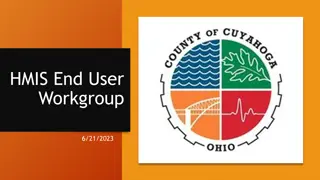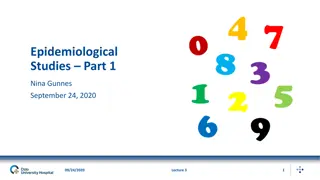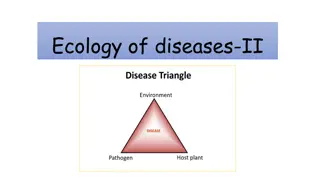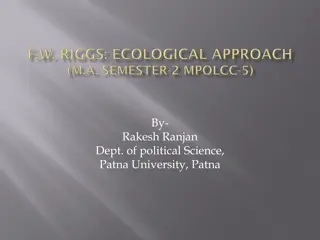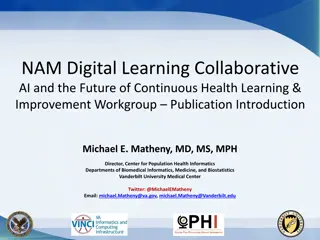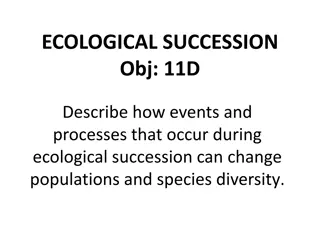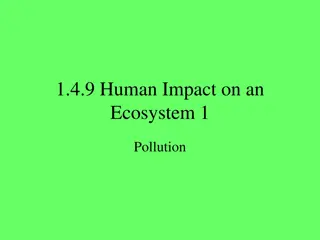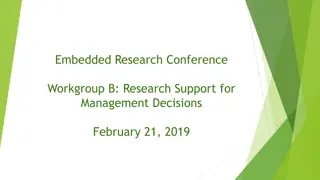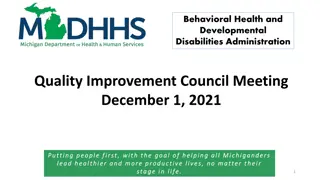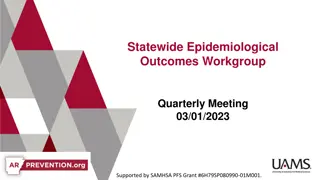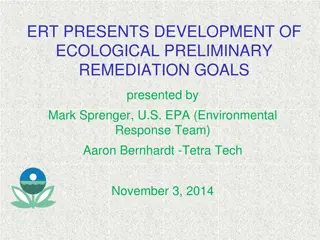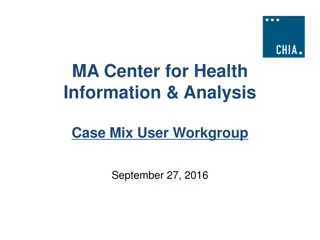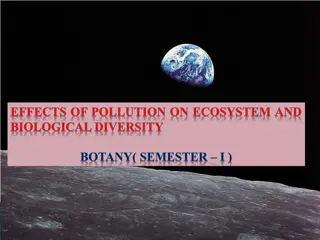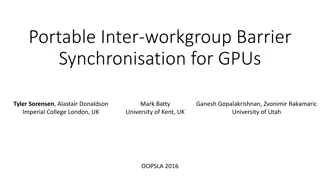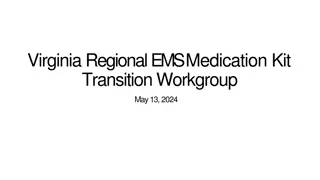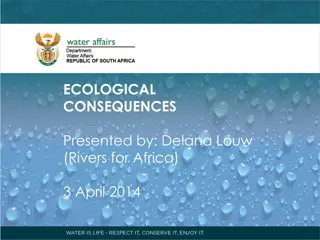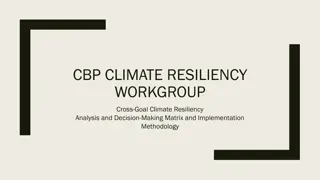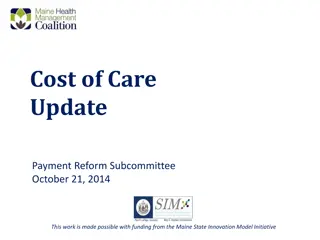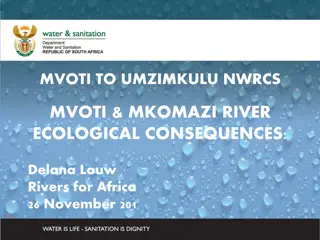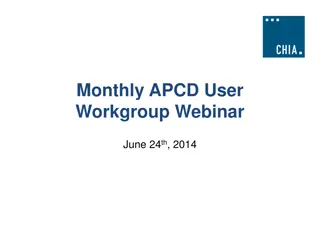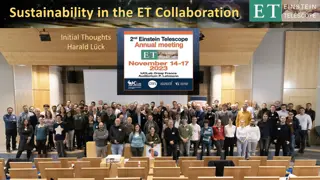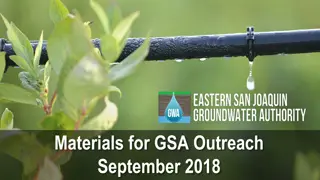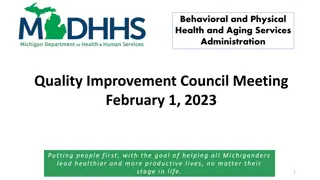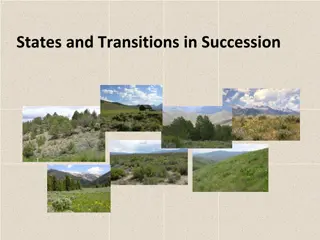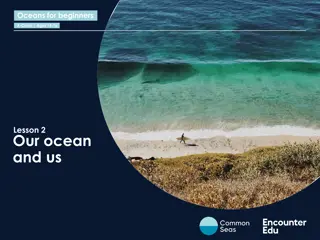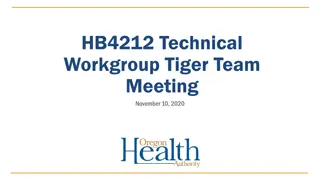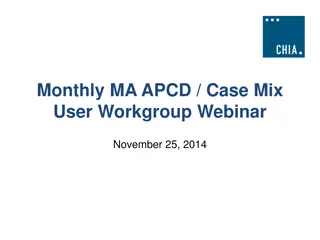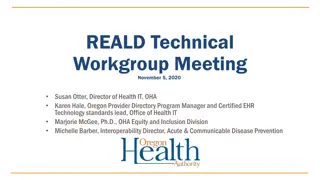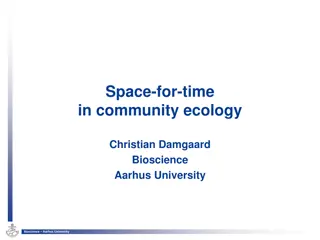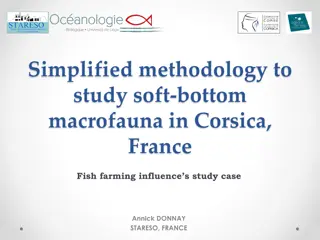Understanding Models with False Positive Detections in Occupancy Modeling
Explore the importance of addressing false positives in occupancy modeling, potential biases caused by them, methods to mitigate errors, and the extension of basic occupancy models to allow for false positives. Key concepts such as the Royle-Link model and the integration of classification processes
10 views • 33 slides
HMIS End User Workgroup Discussion Overview
This post provides key details about the HMIS End User Workgroup meeting held on 6/21/2023. It covers the introduction of committee members, discussions on HMIS data standards, communication strategies, and important resources for end users. The workgroup's vision, purpose, and upcoming changes in t
5 views • 27 slides
Overview of Ecological Studies in Epidemiology
Ecological studies in epidemiology involve studying groups of individuals at a population level to examine the correlation between exposure and disease occurrence. While cost-effective and useful for generating hypotheses, ecological studies have limitations, such as the inability to control for con
3 views • 21 slides
Understanding Ecological Relationships and Food Chains
Explore the intricate ecological relationships in nature, including population dynamics, producer-consumer systems, and different types of consumers like herbivores, carnivores, and decomposers. Learn about food chains, food webs, and the interconnectedness of organisms in ecosystems through informa
0 views • 38 slides
Understanding Ecosystems and Disease Ecology
Explore the diverse types of ecosystems, including autochthonous, anthropurgic, and synanthropic ecosystems, and their impact on disease ecology. Learn about biotopes, biocenosis, ecological mosaics, and ecological interfaces, and discover how infectious diseases can be transmitted across these inte
0 views • 10 slides
Understanding Landscape Architecture: Designing Outdoor Environments
Landscape architecture involves the art and practice of designing outdoor spaces to harmonize with buildings, roads, and natural surroundings. It is a comprehensive discipline that encompasses land analysis, planning, design, management, and preservation, creating healthy and enjoyable spaces for th
1 views • 23 slides
The Ecological Approach in Comparative Public Administration
Fred W. Riggs, a proponent of the Ecological Approach in Public Administration, emphasized the importance of understanding the interaction between administrative systems and their external surroundings. He introduced the Fused-Prismatic-Diffracted Model to explore the unique contexts of developing c
0 views • 21 slides
Advancing Continuous Health Learning: NAM Digital Learning Collaborative AI Workgroup
Explore the intersection of AI and healthcare with the NAM Digital Learning Collaborative AI Workgroup, focusing on enhancing data integration, AI model development, and accelerating progress in continuous health learning. The workgroup aims to develop a reference document for stakeholders to unders
0 views • 18 slides
Understanding Ecological Succession and Its Impacts
Ecological succession is the orderly process of change in an ecosystem, where one community replaces another until a stable climax is reached. This progression affects populations and species diversity. The process involves primary and secondary succession, with events like tornadoes, hurricanes, an
0 views • 23 slides
Understanding Pollution and its Ecological Impact
Pollution is any human addition to the environment that disrupts the ecosystem's ability to sustain life. This includes pollutants like CO2 and chemicals from various sources that harm air, water, and land. Different types of pollution such as industrial, agricultural, and domestic pollution have ad
0 views • 25 slides
Understanding the Relationship Between Ecology and Business
Ecology and business have a complex relationship where human activities impact the ecological environment, and in turn, the environment influences our quality of life. Maintaining ecological balance is crucial for sustainable development, and businesses play a significant role in ensuring environmen
0 views • 19 slides
Understanding Ecological Niches in Advanced Biology
In Advanced Higher Biology, the concept of ecological niches is explored in depth, considering both abiotic and biotic factors that impact an organism's role in its environment. The fundamental and realized niches are distinguished, along with the Competitive Exclusion Principle and examples like sq
4 views • 18 slides
Embedded Research Conference Workgroup B: Management Decisions Support
Workgroup B at the Embedded Research Conference focuses on providing research support for management decisions. The participants aim to identify and prioritize operational questions that could benefit from embedded research, work productively within the existing QI ecosystem, and create an inventory
0 views • 14 slides
Behavioral Health and Developmental Disabilities Administration Quality Improvement Council Meeting - December 1, 2021
The Behavioral Health and Developmental Disabilities Administration Quality Improvement Council met on December 1, 2021, focusing on putting people first to help all Michiganders lead healthier and more productive lives. The meeting agenda included welcome and introductions, updates from BHDDA, work
0 views • 15 slides
ACBCYW Provider Ad Hoc Workgroup Report - February 2020
The ACBCYW Provider Ad Hoc Workgroup Report for February 2020 outlines the objectives of the workgroup, which include reviewing past activities, gathering new information to enhance provider behavior and education on breast cancer in young women, and advising on future programmatic efforts. The repo
0 views • 11 slides
Statewide Epidemiological Outcomes Workgroup Quarterly Meeting Overview
This overview captures the key discussions of the Statewide Epidemiological Outcomes Workgroup Quarterly Meeting. Topics included the NSDUH, Monitoring the Future survey, Youth Risk Behavioral Surveillance Survey, Arkansas Department of Human Services Annual Report, and Crime Information Center data
1 views • 9 slides
Local Government Advisory Committee and Local Leadership Workgroup Collaboration
Collaboration between the Local Government Advisory Committee (LGAC) and the Local Leadership Workgroup (LLWG) focuses on engaging with local decision-makers, implementing strategies for local engagement, and supporting the flow of information among local governments in the Chesapeake Bay watershed
0 views • 10 slides
Eco-Remediation Goals Development Training Overview
This presentation by Mark Sprenger from the U.S. EPA discusses the development of Ecological Preliminary Remediation Goals (PRGs). It covers the process steps, assumptions, risk information activities, and resources related to ecological risk assessment within the EPA's programs. The training module
0 views • 53 slides
Update on MA Center for Health Information & Analysis Case Mix User Workgroup - September 27, 2016
The MA Center for Health Information & Analysis held a User Workgroup meeting on September 27, 2016, providing updates on the status of the Case Mix FY15 readiness application. The session covered information on current release timeframes for various files, application processes, documentation avail
0 views • 18 slides
Understanding Biological Diversity and Ecological Organization
Exploring the intricate balance of flora and fauna on our planet, this content delves into the vast array of plant and animal species coexisting in various ecosystems. It discusses the significance of biodiversity, the interaction of biotic and abiotic components in ecological systems, and the ecolo
0 views • 41 slides
Portable Inter-workgroup Barrier Synchronisation for GPUs
This presentation discusses the implementation of portable inter-workgroup barrier synchronisation for GPUs, focusing on barriers provided as primitives, GPU programming threads and memory management, and challenges such as scheduling and memory consistency. Experimental results and occupancy-bound
0 views • 61 slides
Virginia Regional EMS Medication Kit Transition Workgroup Meeting Summary
During the Virginia Regional EMS Medication Kit Transition Workgroup meeting on May 13, 2024, various important topics were discussed. The agenda included introductions, updates on the final DEA ruling, BOP meeting outcomes, team reports, transition status reports, and open forum discussions. Notabl
0 views • 16 slides
Understanding Ecological Consequences in Ecosystem Management
Delana Louw from Rivers for Africa presented on the ecological consequences of various scenarios in ecosystem management. The process involves delineating units of analysis, stakeholder engagement, quantifying ecological water requirements, evaluating scenarios, and determining management classes. B
0 views • 14 slides
GLRI Ecological Focus Workgroup and Related Charge Questions
The GLRI Ecological Focus Workgroup, comprised of members like John Hull, Dr. Val Klump, Kay Nelson, and Steve Galarneau, focuses on issues such as AOC remediation, invasive species control, nutrient reduction, and habitat restoration in the Great Lakes region. The workgroup addresses key questions
0 views • 13 slides
Chesapeake Bay Climate Resiliency Workgroup Analysis & Implementation
This document outlines the goals and objectives of the Chesapeake Bay Climate Resiliency Workgroup, focusing on increasing the resiliency of the watershed to changing environmental and climate conditions. It includes strategies for monitoring, assessment, adaptation, and project goals to enhance the
0 views • 9 slides
California HOPE Trust Account Program Inaugural Advisory Workgroup Meeting
The California HOPE Trust Account Program's Inaugural Advisory Workgroup Meeting, chaired by State Treasurer Fiona Ma, focused on introductory comments from key figures like Senator Nancy Skinner and Shimica Gaskins. The Executive Director provided an overview of the HOPE Act, outlining its purpose,
0 views • 17 slides
Healthcare Cost Workgroup Initiatives and Strategies Update
Healthcare Cost Workgroup, funded by the Maine State Innovation Model Initiative, focuses on reducing healthcare costs through actionable strategies. The group meets monthly with a diverse range of participants and prioritizes price, delivery system infrastructure, and consumer engagement. They have
0 views • 20 slides
Ecological Consequences Assessment for Conservation Areas
Determining the ecological consequences of various scenarios is crucial for conservation efforts. The assessment focuses on changes in geomorphology, physico-chemical properties, fish populations, macroinvertebrates, and riparian vegetation. By evaluating scenarios based on ecological significance,
0 views • 11 slides
Insights into APCD User Workgroup Webinar Updates
Stay informed with the latest developments in the APCD User Workgroup webinar, including tutorials on identifying emergency room care and dual eligibility. Discover essential details about application releases, upcoming requirements, and medical claims fields to facilitate better healthcare data man
0 views • 14 slides
Sustainability Challenges in ET Collaboration: Addressing Ecological and Non-Ecological Aspects
The ET Collaboration is realizing the importance of sustainability, encompassing ecological and non-ecological aspects. Issues include balancing energy consumption and hardware longevity, remote access possibilities, funding sustainability, social partnerships, and designing instruments with sustain
0 views • 5 slides
Groundwater Sustainability Outreach Update
The update includes details on GSA outreach efforts, project schedules, open house events, and workgroup meetings. Materials, mailers, bilingual flyers, and press releases were distributed to NGOs, businesses, and water suppliers. Social media and local GSA communication strategies were also employe
0 views • 26 slides
Behavioral and Physical Health Council Meeting Highlights - February 1, 2023
The Behavioral and Physical Health and Aging Services Administration Quality Improvement Council Meeting held on February 1, 2023, emphasized putting people first to help all Michiganders lead healthier lives. The agenda included updates on behavioral health, workgroup discussions, promising practic
0 views • 12 slides
Understanding Plant Community Succession and Ecological Transitions
Explore the dynamic process of plant community succession, from pioneer stages to climax communities, and the intricate patterns of transitions in ecological systems. Discover the variability and stability of different states within ecosystems, highlighting the complexities of natural ecological dyn
0 views • 14 slides
Understanding Ecological Goods and Services from Our Oceans
Explore the importance of ecological goods and services provided by oceans in Lesson 2 of the Oceans for Beginners curriculum. Learn about the tangible products, benefits, and services derived from ocean ecosystems, and reflect on their significance. Understand the categories of ecological services
0 views • 15 slides
HB4212 Technical Workgroup Tiger Team Meeting - November 10, 2020
In the HB4212 Technical Workgroup Tiger Team Meeting, participants discussed integrating REALD/HRSA crosswalk into workflows and identified new topics to address. Objectives included wrapping up UDS crosswalk, exploring REALD alignment areas, and aligning with federal reporting categories. The team
0 views • 7 slides
MA APCD Case Mix User Workgroup Webinar Overview
Detailed information about the Monthly MA APCD Case Mix User Workgroup Webinar held on November 25, 2014. Topics covered include Release 3.0 features, common application issues, Rx versioning, questions from current APCD users, announcements, question archive, updates on the new CHIA website, and im
0 views • 16 slides
REALD Technical Workgroup Meeting Summary - November 5, 2020
The REALD Technical Workgroup Meeting held on November 5, 2020, included discussions on various topics like operational questions for OHA, EHR implementation/reporting status, technical coordination review for new members, REALD reporting for providers, and more. Representatives from different hospi
0 views • 22 slides
Understanding Space-for-Time Substitution in Community Ecology
Space-for-time substitution (SFT) is a method used to study slow ecological processes by assuming different sites are at various stages of development. This approach, famous for its role in ecological development, has been critiqued for its implicit use in testing hypotheses on ecological processes
0 views • 7 slides
Centering Equity Workgroup Recommendations for Addressing Racial Health Disparities
The Centering Equity Workgroup focuses on addressing racial health disparities, particularly during the COVID-19 pandemic. Recommendations include identifying root causes, implementing policies to combat systemic racism, and advocating for changes in Michigan law. Accomplishments involve strengtheni
0 views • 7 slides
Study of Soft-Bottom Macrofauna in Corsica, France
This study explores the soft-bottom macrofauna in Corsica, France, with a focus on the influence of fish farming. The research covers the study area, fish farm locations, production levels, and the utility of the JMAMBI index for ecological evaluation. Habitat types and their impact on the JMAMBI in
0 views • 12 slides

